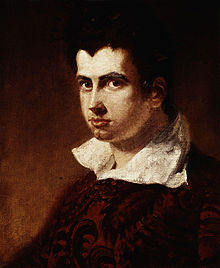Leigh Hunt
James Henry Leigh Hunt (born October 19, 1784 in Southgate near London, † August 28, 1859 in Putney ) was an English writer.
Hunt had several essays and juvenile poems printed in the Juvenile Preceptor when he was a student at Christ's Hospital School in London , then worked for an attorney for a long time and then got a state job, which he gave up, however, in order to devote himself primarily to theatrical criticism.
His excellent essays on theater and dramatic art originate from this period and were published in 1807 under the title Critical essays on the performances of the London theaters . Relentless in discussing ecclesiastical and political circumstances and people, e.g. B. in the pamphlets: On the folly and danger of methodism (1809) and The reformist's reply to an article on the state of parties in the Edinburgh Review (1809), he knew how to introduce radicalism most ingeniously into London journalism, especially in the Examiner, which he founded jointly with his brother John in 1808 and was written in the radical Whiggist spirit .
Because of a dragonfly ( Libell (lat. Libellus, "little book"), court action by the Romans; also svw diatribe, hence Libellist, diabolical writer ) on the prince-regent, later King George IV , he was sentenced to two years incarceration, for which he avenged himself through his Report of an information, filed ex officio by the Attorney general with observations . Later turning exclusively to poetry, he established his reputation as a poet with the genuinely romantic poem The story of Rimini (1816); other poems such as Foliage , The feast of the poets followed.
In 1822 he published the extremely liberal magazine The Liberal with Lord Byron in Italy , which, however, made no luck; the more he caused a stir later with the book Lord Byron and some of his contemporaries (1828).
Worth mentioning are the drama A legend of Florence (1840) and the narrative poem The Pallrey, a love-story of old times (1842), in which the author's lush imagination, unusual eloquence and picturesque representational skills stand out brilliantly.
Other works are:
- Classic tales (1833, 5 volumes); the funny poem
- Captain Sword and Captain Pen (1835); the novels:
- Sir Ralph Esher (1832) and
- Imagination and fancy (1845);
- Men, Women and books (1847, 2 volumes);
- The town (1848);
- Autobiography and reminiscences (1850, 3 volumes);
- The fourth estate , A History of the English Press (1852);
- The religion of the heart , expounding his views on natural religion (1853);
- Notices of Wycherley, Congreve, Vanbrugh and Farquhar (1855).
- The old Court Suburb , description of the London suburb of Kensington (1855, 2 volumes), among others
He also translated Torquato Tasso's Aminta and earned great credit for his excellent modernization of Chaucer .
Web links
- Leigh Hunt Letters , Iowa Digital Library
| personal data | |
|---|---|
| SURNAME | Hunt, Leigh |
| ALTERNATIVE NAMES | Hunt, James Henry Leigh (full name) |
| BRIEF DESCRIPTION | English writer |
| DATE OF BIRTH | October 19, 1784 |
| PLACE OF BIRTH | Southgate (London) , London |
| DATE OF DEATH | August 28, 1859 |
| Place of death | Putney |
